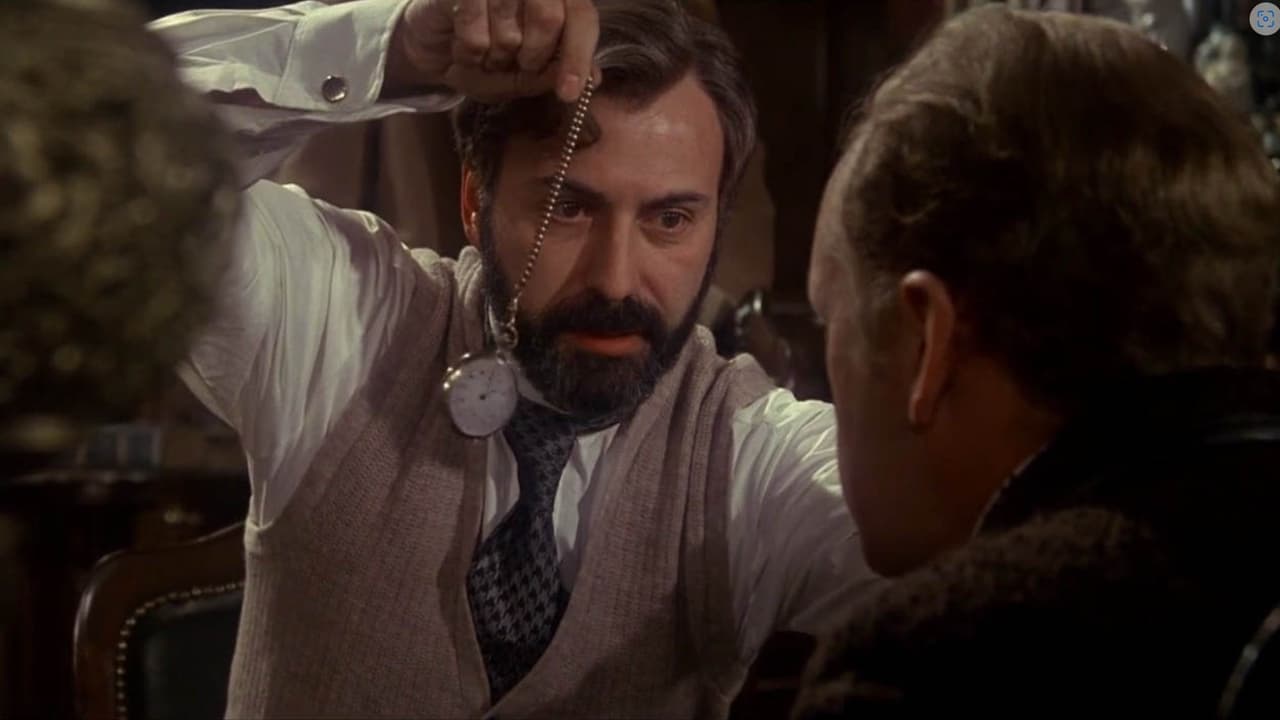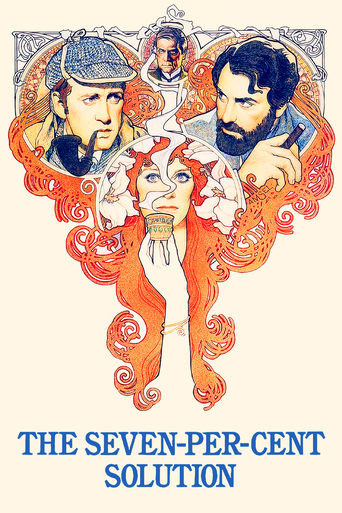ScoobyMint
Disappointment for a huge fan!
Grimossfer
Clever and entertaining enough to recommend even to members of the 1%
Brendon Jones
It’s fine. It's literally the definition of a fine movie. You’ve seen it before, you know every beat and outcome before the characters even do. Only question is how much escapism you’re looking for.
Yash Wade
Close shines in drama with strong language, adult themes.
aramis-112-804880
I first started reading Conan Doyle's Holmes stories in the seventh grade. Shortly after that, Nicholas Meyer appeared on the scene with one of the earliest (and best) Holmes pastiches, THE SEVEN PERCENT SOLUTION." I was too young to catch the pun in the title (I thought "solution" meant solving the puzzle; instead, it refers to an actual amount Holmes used in his cocaine injections).The story's premise is that Dr. Watson, worried about Sherlock Holmes' drug addiction, leads him to Vienna on a false trail where he will embark on a cure by Dr. Sigmund Freud.The biggest problem with the movie is that Sherlock Holmes is billed fourth. But then, he is surrounded by some of the biggest stars of the day.Top-billed Alan Arkin, as Freud, gives a creditable performance. Arkin was one of those inexplicable megastars of the 1970s along with George Segal and Elliott Gould. I don't know what a Viennese accent sounds like, but I'm prepared to believe Arkin nailed it. And his Freud is by turns intellectual and funny, a rare combination.Robert Duvall, not far from "Godfather II" is an odd choice for Watson, but he gives one of the earliest respectable film Watsons. A few had paved the way (i.e., Andre Morell, Colin Blakley) but Duvall's is the first Watson shown as he was in the Holmes stories--a moderately successful London doctor, happily married and living with his wife rather than shacked up in a small apartment with another middle-aged man. He's sharp and incisive, just not as smart as Holmes (or Freud). Watson's loyalty to his friends is admirable.Holmes is played by Nicol Williamson. He's a fine actor and went on to some great things on film (such as Merlin). The excellence of his performance is exemplified by one scene, where he is pulling his "Holmes tricks" for Freud, describing how he knows all about Freud though they never met, yet with the nervous excitement of an addict in desperate need of another fix.Unfortunately, while Williamson's bona fides as an actor are never in doubt, Holmes being billed fourth in a Sherlock Holmes movie is dreadful. Perhaps stars with big names would not be drawn to a project where they would have to battle billing with (then) bankable names like Arkin and Duvall.Then there's the lady in distress, played by Vanessa Redgrave. Another big star of that bizarre time, her part is so small and weird it might well have gone to a lesser actress and let Holmes move up a notch in the billing. Though I never saw Redgrave's charm, she was a big star at the time playing a role beneath her talents.Apart from that, there's the always-blustering Jeremy Kemp. And Laurence Olivier, playing a meek part with his usual scene-stealing aplomb; though he's just a nervous little man, he's the one you watch. Joel Grey from "Cabaret" is lurking around in a most unimportant role for someone who won an Oscar four years earlier.A interesting, if small, part is played by Charles Gray as Sherlock's brother Mycroft. Though in the stories Mycroft should always be played by Robert Morley (who actually did essay the part in "A Study in Terror") but just as Watson is played in the film as a human being, so Gray eschews the fat and misanthropic Mycroft, but he does zero in on Mycroft's alleged power behind the scenes. Trivia: Gray went on to play Mycroft in the Jeremy Brett television series.So, with all the cast in place, the film plays out enjoyably, first with Holmes being analyzed by Freud, and then with Freud caught up in a tongue-in-cheek Holmes-like train chase.The only part that comes off hollow is the uncanonical ending that explains why Holmes is obsessed with Moriarty. It's rather a downer after an evening of fun and excitement with Holmes and Dr. Freud.
ThatMOVIENut
Delving into pseudo-history, Watson (Robert Duvall) gets a drug addicted and neurotic Holmes (Nichol Williamson) to see the father of psychology, Sigmund Freud (Alan Arkin) in a last ditch effort to cure him. However, Holmes must also work a case involving a shady foreign magnate and a beautiful young actress (Vanessa Redgrave), not permitting resurfacing demons to get in the way of his powers.Star Trek veteran Nicholas Meyer's Holmes tale is a fun and surprisingly smart ride. The combination of two geniuses like Holmes and Freud actually lead to some really fascinating scenes as the two size each other up, each intrigued by the other's somewhat unorthodox methods and beliefs, as well as contrast their behaviours. This is supported by the rapport between a subdued and pensive Arkin, and a maverick Williamson who can veer from pathetic and crumbling to imposing and commanding at the drop of a deerstalker. Indeed, the film explores a darker and much more human side to Holmes than most adaptations, delving into his past and the depths of his childhood that later informed his crime fighting abilities.Now this is not to say everything else is a slack: Duvall holds a decent British accent and is suitably supportive and patient as Watson, Redgrave is doe eyed and rather nervous as the troubled actress, and veteran Herbert Ross directs with a swift hand and tight pacing, taking us from the fog of London to the monuments of Vienna and even the top of speeding trains for the climax in good time. Really, complaints are fairly minor, and are simply circumstantial of this type of production: Laurence Olivier is wasted as a rather weak and whiny Moriarty, little more than a cameo, and the film could've gone even more introspective with Holmes and Freud had it not also been bound to being a moderately budgeted adventure thriller, especially in its second half.In that sense, 'Seven Per Cent' may have benefited remaining a book rather than a film, but what we got was still very good and one of my favourite film versions of Doyle's master sleuth.
djensen1
Odd casting all around, rather poor sound design, and some throwback choices (like fast-motion editing in a few places) make this an odd duck. Nicholas Meyer's Holmes fanaticism shows right from the beginning, as the characters are introduced with footnotes! Even the characters themselves refer directly to previous adventures at every opportunity.The cast largely pulls it off, tho, with Alan Arkin's German accent probably the weak link. The sets, costumes, and dialog are terrific, but there are some odd directorial choices, and the pacing is off. The first half drags with Victorian drawing room melodrama as Watson pulls Holmes out of his stupor, then the final act lurches to and fro, attempting to become cinematic with action set pieces.Occasionally inspired, sometimes ridiculous, Meyer's script tries to explain Holmes' psychology and comes off looking a bit like fan fiction rather than the real thing. But it retains its sense of fun, and that makes it pretty watchable.
classicalsteve
The DVD release of "The Seven-Per-Cent Solution" was in the early days of DVD production, which you can tell because it doesn't even have a menu separate from the chapters. (You'd almost think I was talking about the early days of film and/or sound pictures; it was only 10 years ago!) The original DVD edition was quite limited and is now out of print without another scheduled release. The OOP DVD edition (if you can find it) now runs as high as $100 to $150 at second-hand retail stores and $75 to $100 on online auctions. (I think Amazon marketplace sellers have copies starting at $120.) So the question is whether the movie itself justifies the equivalent of buying a new Blu-Ray player. Maybe, maybe not. And, in case you don't know, the story itself is not by Arthur Conan Doyle.To shell out $100+ for an entertainment flick of this sort is probably for hardcore Sherlock Holmes fans. This is not quite the deep suspense film I was expecting with a much more intellectual slant. "Seven Per-cent" is instead a fun mystery-thriller very much in the style of 1970's period pieces set anywhere between the 17th and early 20th centuries, such as "The Great Train Robbery", "Murder on the Orient Express", "The Three Musketeers", "The Count of Monte Cristo", etc. (These movies invariably starred either Sean Connery or Richard Chamberlain.) Seems like trains and sword-fighting were the staples of this era of film-making, and in "Seven Per-cent" you get both.The performance that really saves this film is Nicol Williamson as Sherlock Holmes. He provides a nervous-angst to the character that is rarely seen by the likes of Basil Rathbone and Jeremy Brett. And yet, after having seen Williamson's take on the immortal sleuth, you wonder if this is closer to what Arthur Conan Doyle had in mind. Holmes is somewhat of an intellectual recluse, and Williamson breathes life into this somewhat darker side of Holmes. Holmes was a great sleuth but not necessarily the easiest person with which to get on. The story begins with Holmes suffering from cocaine addiction, making him positively insufferable. His closest associate, Dr Watson (Robert Duvall), resolves to relocate Holmes to Vienna, Austria, for treatment at the hands of none-other than Sigmund Freud (Alan Arkin). Through interesting misdirection, Watson gets Holmes to Freud. Toward the end of his treatment, Holmes becomes enmeshed in another case involving Freud and one of his patients.The movie then literally moves at full-speed ahead with chases, brothels, sword fights, and the obligatory train sequence. However, unlike the first segment involving Holmes' treatment, the second act is never quite fully explained. Not unlike movies today, long action sequences take over the film and the underlying plot is not very well explained. This is certainly an enjoyable movie but far from being one of the best Sherlock Holmes films. The recent offering starring Robert Downey Jr has a bit more depth than this film made 35 years earlier, although Downey's character is 180-degrees from Doyle's. But that said, you almost can't beat Williamson's performance which has to rank as one of the best portrayals of England's greatest detective. If the studios re-released it on DVD, a new price of $15 to $20 seems a lot more elementary.

